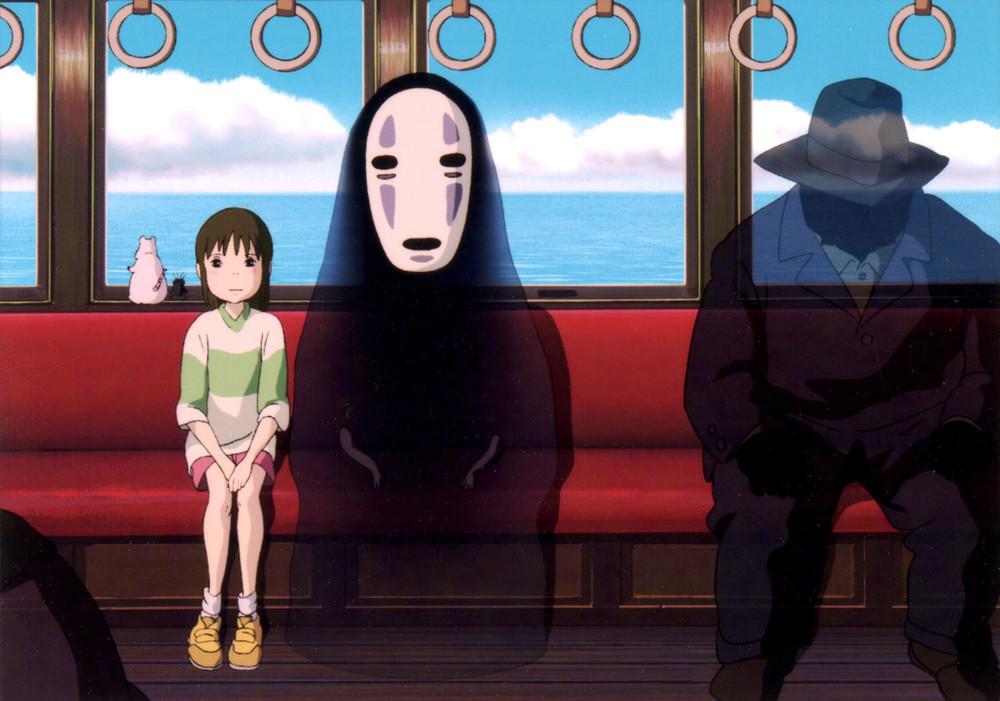The adolescent wizard, Haku (Miyu Irino) takes pity on Chihiro and helps her get acquainted to her new surroundings. He tells her that the pagoda is a spa for spirits run by the witch Yubaba (Mari Natsuki). She holds the names of her workers as collateral, which keeps them in the spa and makes them increasingly forgetful of their previous lives, but it prevents them from fading away into nothing. The most important thing in the spa is to hold a job, so Haku sets Chihiro up as an errand girl for Kamaji (Bunta Sugawara), the mustachioed furnace keeper well able to do his work thanks to his many extra arms. Now being sent throughout the spa, Chihiro is able to take it all in, finding new spirits and obstacles around every corner.
Much of Spirited Away plays out like a Japanese role-playing game, with the plot moving forward through the accumulation of experience or special items. That is said with the utmost charity, as this aspect allows Miyazaki to create several set pieces that are necessary to advance the plot, but mainly function to immerse the viewer in the spa and what’s possible here while also maintaining a pervasive sense of momentum and accomplishment. Two clients, one allowed and one uninvited, give Miyazaki an opportunity to let his imagination run wild. Both also beef up the motifs of gluttony and overconsumption that run through Spirited Away. The invited guest, a lumbering blob, requires the entire staff to help clean him up and results in an ecstatic celebration. The intruder, let in by a trusting Chihiro, is the most iconic creation of the film, the No Face creature. Initially speaking only in breathy grunts, this all-black apparition wears a smiling mask that suggests that behind it is where his face is. That is incorrect. The No Face is a ravenous beast once inside, gobbling up anything in hysterical fashion. Both guests serve as mini-bosses for Chihiro, necessary to continue on her journey back to her life, but their placement in the film is most memorable as a pair of delightful detours. Chihiro’s quest is an easy one to invest in, but simply hanging out in the spa would make a great film all on its own.
There is an endless amount to discover in the spa but Spirited Away is first and foremost about Chihiro. She’s a magnetic protagonist, confident but afraid, tentative but able to rise to a challenge, and charitable above all else. What she is not is graceful. Not quite an adolescent herself, the gangliness of adolescence is already upon her. Miyazaki and his team animate her as a barely controlled tangle of limbs, repeatedly having her move faster than her appendages can carry and spilling over herself into a C shape. Ghibli films are always packed with fantasy imagery and the continuous risk is that the spectacle will outrun the characters. That’s not a concern here, thanks to the endearing writing around Chihiro and Hiiragi’s earnest voice performance.
While not my favorite Miyazaki (My Neighbor Totoro still holds the crown), Spirited Away is as complete a package as any film, animated or otherwise. Wonder with a sprinkle of melancholy, joy without a trace of cynicism, Miyazaki is in complete control of the visual and emotional palette. There is an impossible level of detail in every shot. Things likely stick out on each new viewing. This time, my eye was repeatedly drawn to a fat duck extra with a lily pad hat. Next time, who knows, and there certainly will be a next time. If I’m Chihiro and Miyazaki is Chihiro’s dad, I would gladly follow him to any creative vista he wants to take me to. There’s no one else like him, and there are few films like Spirited Away. A

 RSS Feed
RSS Feed